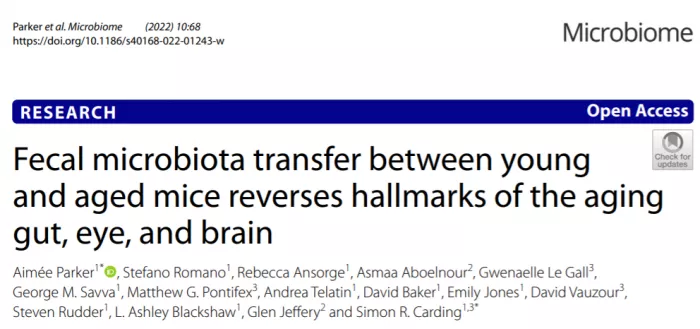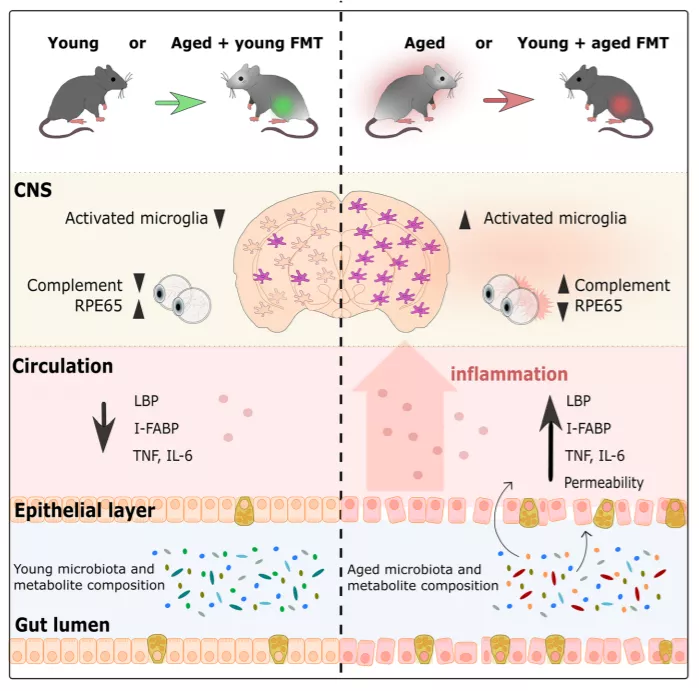As you grow older, have you ever had the following experience? When you look in the mirror, you occasionally find slight wrinkles in the corners of your eyes; The small wound that had healed in two or three days is now cured in a week; The brain seems to be more and more forgetful, and the eyesight is not as good as before. Yes, this is the first act of our battle against aging. Most people may choose to quickly buy all kinds of anti-aging skin care products, functional health products and supplements to resist the attack of years.
But in the future, there may be an anti-aging method that sounds disgusting but may work well: transplant fecal microorganisms from young people . Dare you try?
This idea of using young individuals to resist aging has been verified in many animal experiments. For example, feeding fruit flies with young animal homogenate can increase their life span; Or transplanting microorganisms from young individuals into African killifish can also improve the behavioral decline of old killifish and prolong their life.

Recently, the University of East Anglia and quadram Institute of Biosciences in the UK once again proved this feasible in mice, that is, transplanting fecal microorganisms from young mice . Although the process sounds unfriendly, the effect is really good.
Many aging markers related to the intestine, eyes and brain were reversed when old mice received microorganisms from young mice.
According to the researchers' paper published in the journal microbiome, the microbiota in the intestine is closely related to individual health, especially in maintaining individual intestinal barrier and immune system function. With aging, microbial community structure and function change, which will cause immune abnormalities such as inflammation and metabolic dysfunction**
In addition to the intestine, the organs most affected by this inflammation include the brain . This is because there is complex neural communication between the intestine and brain. When intestinal microorganisms have problems, the brain is more vulnerable to neuroinflammation and functional decline.

▲ transplantation of fecal microorganisms from young individuals reversed the aging markers at multiple organ levels in mice; On the contrary, when the fecal microorganisms of old individuals are transplanted, many indicators of young individuals become worse rapidly (picture source: reference [2 ])
Young and old mice were selected to deliver each other's microorganisms. Taking the young transplanted elderly group as an example, the researchers first need to obtain the feces of young mice and then make fecal slurry. In view of the fact that old mice will not take the initiative to drink "fecal water", the researchers all deliver fecal preparations to mice by gavage .
The transplant recipients took a lot of antibiotics in advance and cleaned the original microorganisms in the intestine to ensure that the transplanted microbiota will occupy the main body.
Although the process was a little uncomfortable, the effect soon appeared.
First, the level of chronic inflammation in the brain of elderly mice receiving fecal transplantation decreased, and the originally over activated microglia became calm, which may have a positive effect on alleviating the lesions caused by neuroinflammation.
In addition, the function of the retina of old mice will also become better , and the protein level related to visual pigment gradually returns to the same level as that of young mice. According to the analysis of retinal samples, the expression of multiple proinflammatory factors in old mice decreased, while the expression of functional visual protein RPE65 increased significantly.
The more direct impact is on intestinal function, transplanting microorganisms from young mice can improve the integrity of intestinal epithelial barrier and reduce the penetration of some inflammatory and destructive molecules into the blood . This can directly reduce the levels of various pro-inflammatory cytokines in the whole blood. Because the vascular network is all over the body, it can be said that the overall aging state of old mice has been reversed.
According to the research, microorganisms in mice of different ages may produce different metabolites in the process of decomposing diet, thus affecting cell function. This similar mechanism is likely to exist in the human body.
In fact, some studies have begun to design oral fecal microbial capsules to help improve insulin sensitivity in patients with obesity and metabolic syndrome. In the future, we may be able to return to youth to some extent by taking similar young people's fecal extract.
Sounds a little excited!